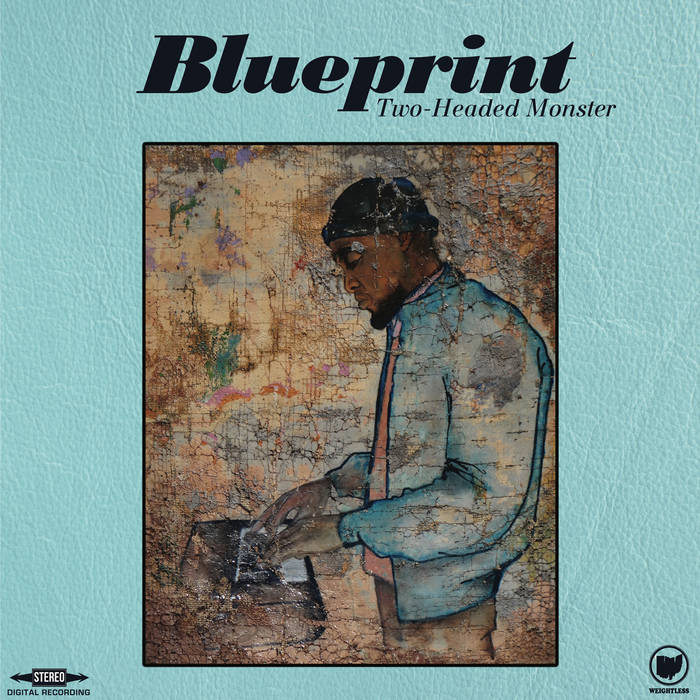Blueprint - Two Headed Monster
Written by Chi Chi Thalken on May 24, 2018Once upon a time, we had to wait quite a while in between Blueprint releases, but ever since we hit the 2010s, the Columbus emcee/producer has been working at a much steadier clip. Now, two years after his last release, the Aesop Rock-produced Vigilante Genesis EP, he returns once again with another self-produced solo album, Two-Headed Monster.
Blueprint has long been one of my favorite artists, and certainly one of the best to produce their own beats and spit their own rhymes. He’s also set himself apart by making some really distinct projects with their own unique sounds. I say this because I was more than ready to be blown away by his latest album and declare it one of my favorites of the year. Unfortunately, this album is a little bit messier than I expected, with a lot of weird expressions of Blueprint’s conflicted feelings about getting older. I was certainly getting excited as I moved from the intro to “Set it Off,” which features some great frantic orchestral samples as Blueprint sets the tone with some shit talking by a guy who’s built a lot on his own over the course of his career. Let’s do this, right? Well, then the song ends with a vocal sample of some old guy talking about how the kids don’t know their hip hop history. I don’t love the tendency towards the old curmudgeon tone, but things take a sharp turn towards the dumb and offensive as this old man starts talking about how these kids should know their history, since their moms wanted to have sex with the older artists. It would be one thing if this sample was in conversation with something else, but it feels more like a cosign the way it’s positioned. Blueprint rights the ship for the next couple of songs, especially with the great groove, crisp drums, and clever lyricism that touches on some great social and political observations in “A Hero Dies Once.” Then we get to “Don’t Look Back,” which wants to say something about not living in the past, but swings between extremes and ends up sounding a bit confused, since he’s preaching more a scorched earth approach to cutting ties with history than just living in the now. Once again, Blueprint rights the ship another one of his best songs, “Night Writers,” which allows Blueprint, Slug, and Wordsworth to discuss how they fell in love with writing. The yo-yoing continues, though, as we get to “Masterpiece.” Built around a short orchestral soul sample, Blueprint starts off with a great narrative about a young artistic girl who doesn’t feel like she fits in, but finds her voice with art. So far, so good. As we move towards the third act of the song, though, things take a weird turn as a she becomes pregnant her senior year, and she frets that her dreams are over and she’ll have to give up her scholarships and dreams of being a darling of the art world, only to have her boyfriend step in and tell her that motherhood is important and that she’s already a star. I don’t necessarily love this turn in the story, but I’m here for a messy discussion about how life throws you curveballs and you figure out how to makes things work, but the song just abruptly ends on this note, hanging the protagonist out to dry, and the next song begins with no further discussion about what becomes of this young woman and her dreams. While I’m trying to figure out what the heck to make out of how that song ends, the album keeps moving, and we actually get one of the best songs on the album, the hard hitting “Health is Wealth,” featuring Supastition and Mr. Lif, as they trade rhymes about watching what you eat, getting exercise, and general self care. If everything was on this level, this review would be much shorter. Things continue to go well as we hit the title track, in which Blueprint rhymes in detail about how he developed his two paths as producer and emcee, with a great use of a sample of El-P saying “I produce and I rap too!” “Pump-Faking” has some great jazz trombone, bass, and drums that pairs well with some clever trash talk. Just when it feels like we’re getting into a good groove, we hit another road bump with “Good Guys Get Ignored,” which just features a lot of confused messaging around the old “nice guys finish last” trope, which is just nonsense to begin with, and the song never finds its footing. From there, the album actually ends on a strong note, with some great songs featuring Aceyalone and Has-Lo, who bring their A game to the proceedings.
Two-Headed Monster features some of the best hip hop of Blueprint’s career, but that only accounts for seventy five percent of the album. The other twenty five percent comes across as old, bitter, and confused in a way that’s off putting. The result is an album that leaves me with a lot of conflicted feelings, especially since this album could have been great with a little bit more editing and more attention paid to the tone of these handful of songs.
| Title: | Blueprint - Two Headed Monster |
|---|---|
| Label: | Weightless |
| Year: | 2018 |
| Rating: | 6/10 |

